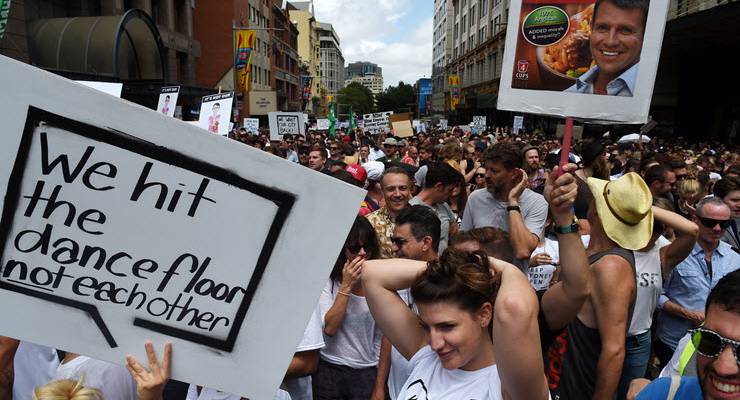
“Lockout” has become my second most used L word, second only to my own surname. Over the last five years I’ve had to use it more frequently than I have “lemons”, “liquor” and telling my family that I love them.
I’ve had to use it to explain why visiting friends can’t get back into a nightclub to watch me DJ after going out for a smoke at 2am; I’ve had to use it on countless panels and radio interviews; I’ve had to use it in a number of particular spicy hot takes, including the one you’re reading now.
As a DJ who relied on playing multiple nightclubs to all hours of the morning each weekend (and as a fan of dancing in multiple nightclubs to all hours of the morning each weekend), I spent most of 2014 desperately trying to have my voice of opposition heard by the government who’d implemented the lockout laws. I was one of thousands of people who marched across Sydney in the first Keep Sydney Open rally. Tom Tilley had me argue with some old man on triple j’s Hack; and almost every week I was the token DJ on a panel of venue owners, liquor board representatives and politicians discussing the lockouts in front of an angry audience who — like everyone on the panel — gained nothing from attending.
That audience was angry because the politicians on the panel never included anyone from the Liberal Party who introduced the laws. No matter how loud the noise opposing the lockouts was, it was ignored by Barry O’Farrell, Mike Baird, Gladys Berejiklian and their staff, who refused to engage with the music and nightclub community at any point over the last five years.
It’s worth noting that everyone within that community thought the violence that led to the lockout laws was horrible, and every nightclub was open to working with the government to create a safer nightlife. But these laws painted all clubs with the same brush, meaning that a small, independent arts and live music venue had to abide by the same laws as a multi-level, million-dollar mega club, regardless of how few violent incidents it had on its record.
Over the years the reports showed a dramatic drop in violence in Kings Cross and the CBD. But it also showed a much more dramatic drop in foot traffic in the area, which led to a dramatic drop in nightclubs.
While many club-goers turned to the lockout free zone of Newtown and Sydney’s inner west for their new night-time entertainment, a majority of them stopped going out altogether. All it takes is the disappointment of being turned away from one club at 1.30am to just stop bothering with nightclubs at all. Melbourne’s nightlife was booming, and Sydney became the laughing stock of Australia as high-profile guests like Justin Bieber and Madonna weren’t allowed into their own after-parties because they got there after lockout.
But the government never responded to the club closures and the decimation of Sydney’s nightlife closure. They didn’t even respond to Justin Bieber! And so the number of people attending anti-lockout rallies and events dwindled as people realised their voice wasn’t being heard by anyone who could do anything about their concerns. Rallying for better nightclub curfews more than once a year feels excessive — the guilt of not focusing on more important concerns really sets in after attending your third lockout protest.
Gladys Berejiklian, NSW’s third premier since the lockout laws were introduced, announced earlier this week that she plans to roll back the lockout laws soon. “Sydney is Australia’s only global city and we need our nightlife to reflect that,” she said. This bizarre statement comes out of nowhere. It’s hard not to immediately suspect the rollback is cover for some heinous announcement the state government plans to unleash on us soon.
If it is genuine, I hope the government works with the few venues that are left in order to help them thrive in a re-energised nightlife environment that’s safe for everyone. I think about this piece by Nayuka Gorrie a lot, about how nightclubs aren’t as inclusive as they should be. I know that everyone — licensing police and club owners alike — could be doing a lot more in that regard.
It’ll take more than just a rollback of these laws to convince a generation of Sydneysiders that it’s cool to stay up late again. I don’t know if Sydney’s nightlife can ever be as vibrant as it was five years ago, but rolling back the lockout laws is definitely a good starting point. At least I won’t have to use that L word anymore.








The lockout laws were used to reduce violence by a small number of drunks but the downsides of the method were many and serious. Why not introduce a high blood alkahol limit for public places but only if it is combined with inapropriate behavior. In other words random breath testing is not allowed.
And the next death?